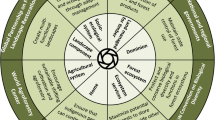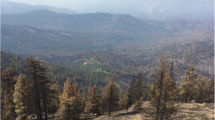Abstract
Detailed interviews were conducted with 11 leading ecologists to obtainindividualqualitative and quantitative estimates of the likely impact of a2 × [CO2] climate change onminimally disturbed forest ecosystems. Results display a much richer diversityof opinion thanis apparent in qualitative consensus summaries, such as those of the IPCC.Experts attachdifferent relative importance to key factors and processes such as soilnutrients, fire, CO2fertilization, competition, and plant-pest-predator interactions. Assumptionsand uncertaintiesabout future fire regimes are particularly crucial. Despite these differences,most of the expertsbelieve that standing biomass in minimally disturbed Northern forests wouldincrease and soilcarbon would decrease. There is less agreement about impacts on carbon storagein tropicalforests. Estimates of migration rates in northern forests displayed a rangeof more than fourorders of magnitude. Estimates of extinction rates and dynamic response showsignificantvariation between experts. A series of questions about research needs foundconsensus on theimportance of expanding observational and experimental work on ecosystemprocesses and ofexpanding regional and larger-scale observational, monitoring and modelingstudies. Results ofthe type reported here can be helpful in performing sensitivity analysis inintegrated assessmentmodels, as the basis for focused discussions of the state of currentunderstanding and researchneeds, and, if repeated over time, as a quantitative measure of progress inthis and other fieldsof global change research.
Similar content being viewed by others
Reference
Brockhoff, K.: 1975, ‘The Performance of Forecasting Groups in Computer Dialogue and Face-to-Face Decisions’, in Linstone, H. A. and Turoff, M. (eds.), The Delphi Method: Techniques and Applications, Addison-Wesley, Reading, MA, p. 620.
Budnitz, R. J., Apostolakis, G., Boore, D. M., Cluff, L. S., Coppersmith, K. J., Cornell, C. A., and Morris, P. A.: 1995, Recommendations for Probabilistic Seismic Hazard Analysis: Guidance on Uncertainty and the Use of Experts, Lawrence Livermore National Laboratory, UCRL-ID 122160, p. 170.
Budnitz, R. J., Apostolakis, G., Boore, D. M., Cluff, L. S., Coppersmith, K. J., Cornell, C. A., and Morris, P. A.: 1998, ‘Use of Technical Expert Panels: Applications to Probabilistic Seismic Hazard Analysis’, Risk Anal. 18, 463–469.
Dalkey, N. C.: 1970, The Delphi Method: An Experimental Study of Group Opinion, Technical Report RM-5888-PR, The Rand Corporation, Santa Monica, CA.
Dawes, R. M.: 1988, Rational Choice in an Uncertain World, Harcourt Brace, p. 346.
DeGroot, M.: 1970, Optimal Statistical Decision, McGraw-Hill.
Gustafson, D. H., Shukla, R. K., Delbecq, A., and Walster, G. W.: 1973, ‘A Comparative Study of Different Subjective Likelihood Estimates Made by Individuals, Interacting Groups, Delphi Groups, and Nominal Groups’, Organ. Behavior Human Perform. 9, 200–291.
Intergovernmental Panel on Climate Change: 1996, Climate Change 1995: Impacts, Adaptation and Mitigation of Climate Change, Cambridge University Press, New York, p. 878.
Kahneman, D., Slovic, P., and Tversky, A. (eds.): 1982, Judgments under Uncertainty: Heuristics and Biases, Cambridge University Press.
Linstone, H. and Turoff, M.: 1975, The Delphi Method: Techniques and Applications, Addison-Wesley.
Morgan, M. G.: 1998, ‘Uncertainty Analysis in Risk Assessment’, Human Ecol. Risk Assess. 4, 25–39.
Morgan, M. G. and Henrion, M.: 1990, Uncertainty: A Guide to Dealing with Uncertainty in Quantitative Risk and Policy Analysis, Cambridge University Press, New York.
Morgan, M. G. and Keith, D.: 1995, ‘Subjective Judgments by Climate Experts’, Environ. Sci. Technol. 29, 468–476.
Morgan, M. G., Morris, S. C., Henrion, M., and Amaral, D. A.L.: 1985, ‘Uncertainty in Environmental Risk Assessment: A Case Study Involving Sulfur Transport and Health Effects’, Environ. Sci. Technol. 19, 662–667.
Morgan, M. G., Morris, S. C., Henrion, M., Amaral, D. A. L., and Rish, W. R.: 1984, ‘Technical Uncertainty in Quantitative Policy Analysis: A Sulfur Air Pollution Example,’ Risk Anal. 4, 201–216.
Morgan, M. G., Morris, S. C., Meier, A. K., and Shenk, D. L.: 1978, ‘A Probabilistic Methodology for Estimating Air Pollution Health Effects from Coal-Fired Power Plants,’ Energy Systems Pol. 2, 287–310.
Morgan, M. G., Morris, S. C., Rish, W. R., and Meier, A. K.: 1978, ‘Sulfur Control in Coal-Fired Power Plants: A Probabilistic Approach to Policy Analysis’, J. Air Pollut. Control Assoc. 28, 993–997.
Moss, R. and Schneider, S. H.: 2000, ‘Uncertainties – Guidance Papers on the Cross Cutting Issues of the Third Assessment Report of the IPCC’, in Pachauri, R., Taniguchi, R., and Tanaka, K. (eds.), World Meteorological Organisation, Geneva, Switzerland.
National Assessment Synthesis Team: 2000, ‘Climate Change Impacts on the United States’, Public Review Draft, U.S. Global Change Research Program, Washington, D.C., p. 145.
National Defense University: 1978, Climate Change to the Year 2000: A Survey of Expert Opinion, Report published by the National Defense University in cooperation with the U.S. Department of Agriculture, the Defense Advanced Research Projects Agency, the National Oceanic and Atmospheric Administration, and Institute for the Future,Washington, D.C.; for a critique see Stewart, T.R. and Glantz, M. H.: 1985, ‘Expert Judgment and Climate Forecasting: A Methodological Critique of Climate Change to the Year 2000’, Clim. Change 7, 159–183. ELICITATION OF EXPERT JUDGMENTS OF CLIMATE CHANGE IMPACTS 307
National Research Council: 1992, Policy Implications of Greenhouse Warming: Mitigation, Adaptation and the Science Base, Report by the Panel on Policy Implications of Greenhouse Warming of the Committee on Science, Engineering and Public Policy, National Academy Press, p. 918.
Nordhaus, W. D.: 1994, ‘Expert Opinion on Climate Change’, Amer. Sci. 82, 45–51.
Rotmans, J. and Dowlatabadi, H.: 1998, ‘Ch. 5: Integrated Assessment Modeling’, in Rayner, S. and Malone, E. (eds.), Human Choice and Climate Change: Volume 3, Battelle Press, p. 429.
Seaver, D. A.: 1978, Assessing Probabilities with Multiple Individuals: Group Interaction versus Mathematical Aggregation, Tech. Report SSRI-78-3, Social Science Research Institute, University of Southern California, Los Angeles.
Spetzler, C. S. and Staël von Holstein, C.-A. S.: 1975, ‘Probability Encoding in Decision Analysis’, Manage. Sci. 22, 340–352.
Stein, B. A. and Flack, S. R.: 1997, 1997 Species Report Card: The Status of U.S. Plants and Animals, The Nature Conservancy, Washington, D.C.
Stewart, T. R., Mumpower, J. L., and Reagan-Cirincione, P.: 1992, Scientists Agreement and Disagreement about Global Climate Change: Evidence from Surveys, Research Report from the Center for Policy Research Nelson A. Rockefeller College of Public Affairs and Policy, State University of New York, Albany, New York (in addition to reporting the results of their e-mail survey, this report also summarizes several other surveys).
vonWinterfeldt, D. and Edwards, W.: 1986, Decision Analysis and Behavioral Research, Cambridge University Press, New York.
Wallsten, T. S. and Whitfield, R. G.: 1986, Assessing the Risks to Young Children of Three Effects Associated with Elevated Blood Lead Levels, ANL/AA-32, Argonne National Laboratory.
Watson, S. R. and Buede, D. M.: 1987, Decision Synthesis: The Principles and Practice of Decision Analysis, Cambridge University Press, New York.
Author information
Authors and Affiliations
Rights and permissions
About this article
Cite this article
Granger Morgan, M., Pitelka, L.F. & Shevliakova, E. Elicitation of Expert Judgments of Climate Change Impacts on Forest Ecosystems. Climatic Change 49, 279–307 (2001). https://doi.org/10.1023/A:1010651300697
Issue Date:
DOI: https://doi.org/10.1023/A:1010651300697




